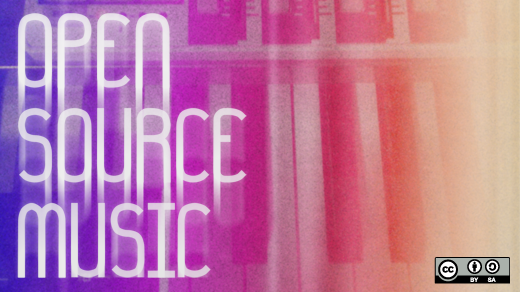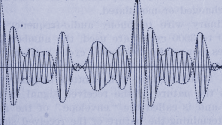When people think "free and open source software," a lot of different programs come to mind. One may think of Mozilla's popular Firefox browser, which is for many the first free software package they've used. The Linux kernel, which powers everything from phones to the world's fastest supercomputers, may spring to mind. GNU/Linux operating systems such as Fedora, Debian, and Red Hat Enterprise Linux may feature prominently in one's thoughts, or these days, so may Android. However, one class of applications will not immediately come to mind when most folks consider free and open source software—music production software.
Hear Adam Drew in an
Open Your World webcast
Date: April 20
Time: 11 a.m. PDT,
2 p.m. EDT (GMT -4)
Register now.
There are many reasons why one may not immediately think "music production" when considering free and open source software. Music recording and engineering is a bit of a niche market, and many people may never have considered recording their own music at home. For those who do, big brand names like Apple and Digidesign have a monopoly on coolness, leading people to those solutions for creative work without ever considering free competitors. And still others harbor the old and rusty meme that free and open source software is only good for "nerdy things" like kernels, servers, and compilers. Whatever their reasons, many people never consider free software for their creative work. Most opt for non-free solutions by default, either not knowing, not caring, or not believing that there is an entire world of free and open source software available for music production that is as good as—or in my experience, better—than the non-free alternatives.
It may come as a surprise to some, but the free and open source music application scene is vibrant and diverse. There are hundreds of packages available that provide everything from MIDI sequencers and virtual instruments, to real time effects, to recording, engineering, and editing. Though these packages all come from different people and projects, they all work seamlessly together through the high-performance JACK audio subsystem. Whatever it is that one wishes to do with audio, one will find an application for. And these are not featureless, immature imitations of non-free products, these are rock-solid and feature-rich applications that stand on their own accord with their own unique technical and creative merits.
If you are someone who records music, either professionally or as a hobby, learning that there's an opportunity to move to free and open source software for your work may pique your interest. However, two questions will invariably spring to mind that cannot be ignored. One should ask, "Even if there are good free and open source audio apps, why should I care? My current software works fine." And following that, the question quickly becomes, "I am proficient with my current software and don't want to have to learn everything all over again. How can I quickly learn about free audio software and get help if I need it?" If you are a dedicated free and open source software user who considers software freedom an automatic "must have," then the question of "why switch" answers itself. However, even if software freedom doesn't factor strongly into your software choices, there are still plenty of reasons to investigate switching.
Advantages over non-free alternatives
Free and open source music production software has some major real-world advantages over non-free solutions. One huge plus is kissing registration keys, dongles, and license activation checks goodbye. Those sorts of hassles are unique to non-free software; you wont ever have to waste a port on a dongle or worry about losing a license key again. Being able to share software with your collaborators is also a major advantage. If you like a plugin or program, you can just give it to a collaborator. With non-free software, all you can say is "this program is cool—but I can't share it with you."
Additionally, free and open source music software is highly interoperable by design. Every program works with every other program with ease. Compare this to monolithic "everything and the kitchen sink" applications like Logic and ProTools that take pains to keep you locked in and don't inter-operate well with software from other vendors. Interoperability doesn't just sound nice—it has real creative implications. You don't have to choose between one piece of software or the other. You can use both together for their relative strengths. There are also the cost and choice factors. Proprietary music software is extremely expensive. It's not uncommon to pay hundreds of dollars for the software itself and then a hundred or more for yearly upgrades. And to add insult to injury, non-free music software is often arbitrarily tied to certain hardware that is itself expensive. Take as examples Digidesign's practice of working only with certain audio interfaces or Apple shipping only Logic for Macs. With the free alternatives, you are free to pick your hardware and software combination. If you've worked with audio for any length of time, some (or likely all) of the above problems have bitten you at some point in time. With free and open source music software, those problems become a thing of the past.
Learning all over again—or maybe not that much
Considering switching to free and open source audio software or incorporating it into your current workflow may sound pretty appealing now that the value proposition has been explained, but what about the problem of getting up to speed? Will it require relearning everything you know from the ground-up? How can you get help and find information to make the switch easier? Making the switch will take work. It will require learning new ways of doing things and working with new software. However, if you already record with computers then most everything you know about recording, editing, and audio will directly translate to the free tools. You'll have to learn the new tools themselves, but the vast majority of your techniques will still apply. Additionally, there are tools out there to help. The Fedora project has put together a great document called the Musicians' Guide if you'd like to use Fedora to record music. There's also Ubuntu Studio, a distribution of Ubuntu that comes already set up for music. Ubuntu Studio also has its own documentation available and a community wiki.
I run a knowledgebase dedicated to helping people with the sorts of questions one is likely to encounter while learning to switch to free tools. I switched from Logic on the Mac and documented what I learned on that knowledgebase as I learned it, hoping that it would help others later. Finally, I will be giving a live webcast here on opensource.com on April 20 showing some of the free tools in action and answering questions.
Music and audio production software are some of the greatest achievements of the free and open source movement, but they aren't well known out in the wider industries and communities that stand to best benefit from it. Free software projects are directly enriched by having more people using, testing, and working with them. More users mean more feedback and contributions, which then directly translate to better software. I hope that after reading this you are excited about the opportunities that lie in free and open source software for music production and are considering investigating it further. I also hope that you will join me here on opensource.com to see the tools in action and get your questions answered.







4 Comments